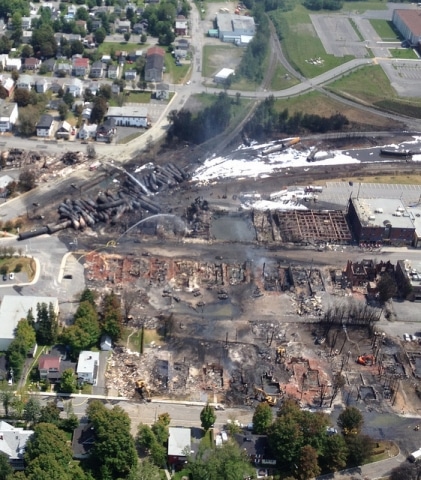The deadly oil train disaster in Lac Megantic, Quebec on July 5, which (as of this writing) has left 33 people dead, with 17 still missing, and contaminated over 60 miles of local drinking water sources, has initiated a curious response across the media spectrum.
Some observers cite this accident as reason to consider pipelines, rather than trains, as the safer choice to transport oil and gas fossil fuels.
Two new major reports, however, reveal that this question misses a much larger point: oil, gas, and coal – the fossil fuel trio – indeed are inherently unsafe industries regardless of the mode of transport.
The first report, from Environment & Energy Publishing (E&E), an organization which focuses on energy policy and markets, examined on-shore oil and gas and documented over 6,000 spills and accidents at oil and gas sites in 2012 – an average of more than 16 spills a day. A total of 15.6 million gallons of oil, fracking fluid, wastewater and other liquids were reported spilled at production sites during 2012. That’s more than the 11 million gallons of oil that leaked from the shattered hull of the Exxon Valdez in 1989.
This represents a significant increase in accidents since 2010 and parallels the dramatic rise in drilling activity across key oil and gas producing states, such as North Dakota, Pennsylvania and Wyoming.
The second report, as reported on June 7 in The Gaurdian, focuses on the off-shore oil industry in Britain. The report, compiled by Greenpeace, was based on ‘petroleum operations notices’ (PON1s) as reported to the UK Department of Energy and Climate Change, and documented more than 55 oil leaking accidents in the North Sea in June 2013 alone.
Greenpeace said the alarming statistics should act as a reality check for an industry that was trying to persuade the world it should be allowed to drill in the pristine waters of the Arctic.
“They’re trying to convince the world that they can operate safely in one of the world’s harshest environments, yet they can’t prevent this steady trickle of oil and other polluting chemicals leaking into the relatively safe waters of the North Sea,” said Greenpeace senior climate adviser Charlie Kronick. “This will do little to increase public trust in their ability to drill in the Arctic without damaging this incredibly beautiful and fragile corner of our planet.”
The report found over 100 oil spills in the North Sea since the beginning of the year.
The Quebec disaster underscores a trend in which North America’s oil is increasingly transported by train, as plans for new pipelines stall and existing lines struggle to keep up with demand.
Wilma Subra, a Louisiana-based environmental scientist who monitors the oil and gas industry, said that the industry is not doing enough to ensure public safety.
“They admit that it happens all the time,” Subra said in an interview with Environment and Energy Daily.
Subscribe to our newsletter
Stay up to date with DeSmog news and alerts





